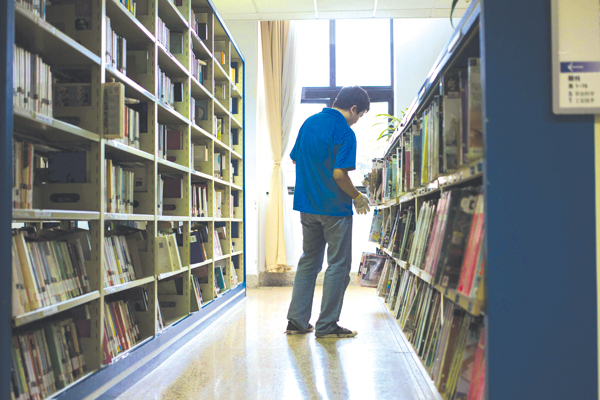Working with autism
 |
|
[Photo/China Daily] |
Ding Cui, Gu's teacher in the Shanghai Changning District Primary Vocational School, says the school conducts courses on psychological health, language, basic math, cooking, baking and gardening for autistic students.
Autistic sufferers are characterized by restricted, repetitive or stereotyped behavior, so Ding suggests they choose jobs involving less communication, such as organizing goods in a supermarket, sorting books in a library, delivering newspapers, watering plants in parks, playing musical instruments and painting.
In reality, however, employers tend to shun these people for fear of trouble or failing to understand their seemingly "weird behavior".
Gu's position in the library was discreetly considered, according to Liu Yan, a library official.
"The major problems of those with autism lie in communication and social interaction, therefore, we designed a position involving some social contact but less mingling with readers. At the same time, he gets to experience working life and earn his own living," Liu says.
But she admits that it is part of the library's social responsibility and offering more such positions would be difficult.
Since the first official diagnosis of autism in China in 1985, thousands of autistic children have reached adulthood and most are not as lucky as Gu.
Many stayed at home with their families after leaving school at 16, as they have no place to go nor skills to live independently, according to Wen Hong, chairman of China Association of Persons with Psychiatric Disability and Their Relatives.
"The risk is that the capabilities they achieved through rehabilitation in school would be degraded and they become a burden to their families," she says.
There are care centers where less severe autistic sufferers can do some handiwork but that's restricted to only some big cities. And the centers are facing a shortage of social workers who are capable of attending to these people, she says.
It is estimated that China has at least 1.5 million autistic sufferers, while Wen believes the real number is much higher. Authoritative national data is not yet available.
Around the world, the number of children diagnosed with autism is increasing rapidly. The latest US report says that 2 percent of children under 17 in the country have been diagnosed with autism, according to Wen.
In 2012, Wen founded Kangnazhou, a non-governmental organization that aims to provide life skill training to older autistic children.
"For autistic children, earning a living with dignity is an important step to integrate into society. We need to provide a tolerant and supportive atmosphere for them," she says.






















